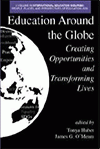
Education Around the Globe
Creating Opportunities and Transforming Lives
Edited by:
Tonya Huber, Texas A&M International University
James G. O’Meara, Texas A&M International University
A volume in the series: International Education Inquiries: People, Places, and Perspectives of Education 2030. Editor(s): Tonya Huber, Texas A&M International University.
Published 2021
International Education Inquiries is a book series dedicated to realizing the global vision of The United Nations’ (2015) Transforming Our World: The 2030 Agenda for Sustainable Development. As resolved by the UN General Assembly (on 25 September 2015; see UN, 2015 October):
The 17 Sustainable Development Goals and 169 targets which we are announcing today demonstrate the scale and ambition of this new universal Agenda. They seek to build on the Millennium Development Goals and complete what they did not achieve. They seek to realize the human rights of all and to achieve gender equality and the empowerment of all women and girls. They are integrated and indivisible and balance the three dimensions of sustainable development: the economic, social and environmental.
The United Nations' goals and targets will stimulate action over the next decade in areas of critical importance for humanity and the planet... We are determined to end poverty and hunger, in all their forms and dimensions, and to ensure that all human beings can fulfil their potential in dignity and equality and in a healthy environment.
This vision includes to “ensure inclusive and equitable quality education and promote lifelong learning opportunities for all” (SDG4, UN, 2017). The founding co-editors seek to provide a forum for the diverse voices of scholars and practitioners from across the globe asking questions about transforming the vision of Education 2030 into a reality. Published chapters reflect a variety of formats, free of methodological restrictions, involving disciplinary as well as interdisciplinary inquiries. We expect the series will be a leading forum for pioneers redefining the international professional knowledge base about the people, places, and perspectives shaping Education 2030 outcomes and the meaning of global citizen education (UNESCO, 2015).
Education 2030 topics of interest include, but are not limited to the following:
• Improving access to quality early childhood development, care, and pre-primary education.
• Ensuring equal access for all women and men to affordable and quality education.
• Increasing the number of youth and adults who have skills relevant for sustainable living and livelihoods.
• Ensuring equal access for the vulnerable, including persons with disabilities, indigenous peoples, and children in vulnerable situations.
• Achieving levels of literacy and numeracy required to engage in communities and employment.
• Acquiring the knowledge and skills needed to promote sustainable development, including: education for sustainable development and sustainable lifestyles, human rights, gender equality, promotion of a culture of peace and non-violence, global citizenship education, and the appreciation of cultural diversity and of culture’s contributions to sustainable development.
• Providing safe, non-violent, inclusive and effective learning environments for all.
• Recruiting, preparing, supporting, and retaining quality teachers.
CONTENTS
Editor’s Introduction: Principles and Priorities for Progress in the Education 2030 Era, James G. O’Meara. PART I: PEACE, PEOPLE, PROSPERITY, AND UNIVERSALITY. Sustaining Education in the Palestinian Territories: Challenges and Opportunities, Mahmoud Suleiman and Jawad Abadi. Examining Inequities in Grading Practices to Empower the Disadvantaged Learner: A Global Perspective, Mahmoud Suleiman and Joshua P. Kunnath. Assessing the Influence of Female-Led, Language-Acquisition Programs on Life Satisfaction and Gender Role Attitudes in Women and Children in the Dominican Republic, Angélique M. Blackburn, Alexandra Reyes, and Tonya Huber. Foundation Pierre Smith Mondelus, A Case Study: Decreasing Illiteracy in Northern Haiti, Eugenia Charoni. PART II: PARTNERSHIPS, PLANET, INTERCONNECTEDNESS, AND INDIVISIBILITY. Creating a Doctoral Network for Teacher Education in Africa, Irma Eloff, Antonio Cipriano Gonçalves, Alois Chiromo, Amani Ibrahim Abed Elgafar, Hyleen Mariaye, and Therese Tchombe. Learning to Act: Smithsonian Science for Global Goals and Empowering Young People to Develop a Habit of Considered Action-Taking, Heidi Gibson, Katherine Pedersen Blanchard, and Carol O’Donnell. A New Generation of Global Leaders – Turning Global Citizens Into Global Stewards, Carlise Womack Wynne, Erin Barding, and Brad Bailey. Promoting Sustainable Development in Study Abroad Programs: Focus on Social Justice in Honduras and Tanzania, Jill Newton, Alankrita Chhikara, Stephanie Oudghiri, Erin Rondeau-Madrid, Michael Lolkus, and JoAnn Phillion. About the Editors and Editorial Advisory Board. About the Authors. Recognizing Reviewers’ Critical Feedback.
-
Paperback978-1-64802-177-0
Web price: $45.04 (Reg. 52.99)
-
Hardcover978-1-64802-178-7
Web price: $80.74 (Reg. 94.99)
- eBook978-1-64802-179-4

- EDU020000 - EDUCATION: Multicultural Education
- EDU029000 - EDUCATION: TEACHING METHODS & MATERIALS: General
- EDU046000 - EDUCATION: Professional Development
-
 A Practical Guide to Exemplary Professional Development Schools
A Practical Guide to Exemplary Professional Development Schools
-
 Beyond Provincialism
Promoting Global Competencies in Teacher and Educator Preparation
Beyond Provincialism
Promoting Global Competencies in Teacher and Educator Preparation
-
 Cultivating Democratic Literacy Through the Arts
Guiding Preservice Teachers Towards Innovative Learning Spaces in ELA Classrooms
Cultivating Democratic Literacy Through the Arts
Guiding Preservice Teachers Towards Innovative Learning Spaces in ELA Classrooms
-
 Faculty Learning Communities
Working Towards a More Equitable, Just, and Antiracist Future in Higher Education
Faculty Learning Communities
Working Towards a More Equitable, Just, and Antiracist Future in Higher Education
-
 Global Citizenship Education at TAMIU Elevating Education at the Frontera
The Role of Faculty and Administrators
Global Citizenship Education at TAMIU Elevating Education at the Frontera
The Role of Faculty and Administrators
-
 Teacher Education at the Edge
Expanding Access and Exploring Frontiers
Teacher Education at the Edge
Expanding Access and Exploring Frontiers
-
 The Undivided Life
Faculty of Color Bringing Our Whole Selves to the Academy
The Undivided Life
Faculty of Color Bringing Our Whole Selves to the Academy

